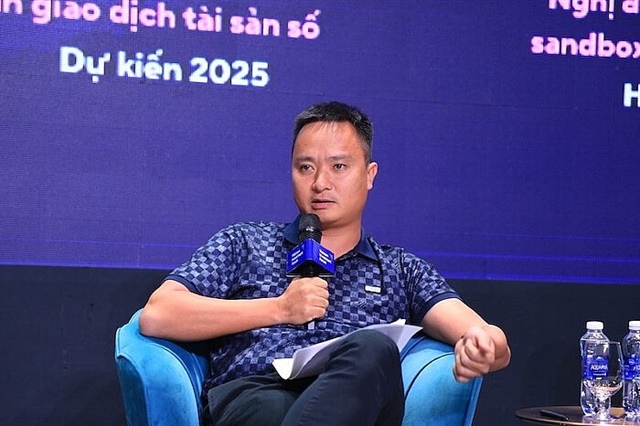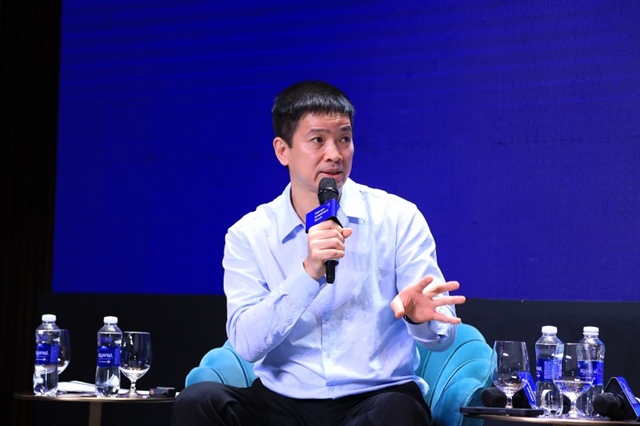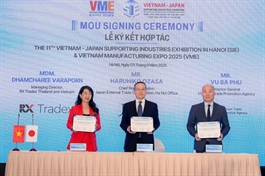Potential new crypto exchange aims to boost blockchain exports
Potential new crypto exchange aims to boost blockchain exports
The establishment of a regulated virtual asset exchange could support Vietnam’s digital technology exports by providing a platform for domestic blockchain projects to access international markets, potentially increasing foreign currency earnings.
Mai Huy Tuan, CEO of SSI Digital, believes the establishment of a virtual asset trading platform is a promising development, which could make virtual assets a significant resource for the Vietnamese economy.
"In the digital age, virtual assets can be exported globally, generating foreign currency for Vietnamese people. In fact, there are already several tech unicorns in Vietnam operating in this field, with numerous domestic projects valued at hundreds of millions of USD," said Tuan, speaking at Vietnam Investment Forum 2025: Mid-Year Update in Hanoi on June 3.
Tuan added that many Vietnamese enterprises stand ready to participate in the pilot phase, revealing that his company has prepared more than 200 specialised personnel, made investments in infrastructure and software, and established partnerships with international players and custodians to operate a virtual asset trading platform.
"We are only waiting for the official legal framework to launch immediately. We have already explored all models, both centralised, decentralised, and international security standards" he said.
"SSI Digital has also established the SSI Digital Ventures investment fund and committed $200 million to blockchain and AI projects, with a particular focus on those originating from Vietnam."

Mai Huy Tuan, CEO, SSI Digital |
Also attending the forum, Doan Mai Hanh, head of Sales and Trading – Markets Division at Techcom Securities remarked that recent moves by regulatory bodies to build a digital technology infrastructure reflect a proactive and positive approach, recognising virtual assets as a legitimate asset class.
"This will open opportunities for all market participants, from service providers and firms seeking new fundraising channels to investors looking to diversify their portfolios. Currently, commercial banks, securities firms, insurance companies, asset management firms, and tech companies hold distinct advantages to participate in this market," said Hanh.
Hanh noted that banks should be the first to get involved due to their strong financial capacity and ability to act as liquidity backstops, saying, "They already have effective identity verification, risk assessment procedures, and anti-money laundering mechanisms in place. Even insurance companies can contribute by offering insurance solutions to help investors mitigate risks and losses in this volatile market. As for tech firms, their role is indispensable because blockchain technology is precisely their domain."
Hanh also cited the Draft Resolution on the Pilot Implementation of the Virtual Asset Market in Vietnam, which includes a provision requiring businesses to have at least $400 million in charter capital to obtain a licence for providing virtual asset exchange services.
"This is a significant barrier, not only a matter of capital mobilisation but also of governance; how to ensure liquidity, manage risk, and generate returns amid an unclear regulatory landscape," she added.
To Tran Hoa, deputy director of the Securities Market Development Department at the State Securities Commission of Vietnam, said that while such requirements are appropriate, they are not yet sufficient.
"Firstly, in addition to the requirement that 35 per cent of the $400 million must come from two out of five designated types of institutions, the remaining 65 per cent must also come from organisations, not individuals. That’s a crucial point," said Hoa. "A virtual asset service provider essentially functions as a combination of an exchange, a custodian, and a brokerage firm, covering roles such as market operation, custody, clearing, and issuance. Therefore, the capital scale of such enterprises must be sufficiently large to ensure comprehensive operations."

To Tran Hoa, deputy director, Securities Market Development Department, State Securities Commission of Vietnam |
Hoa also referred to international practices, noting that many countries require virtual asset exchanges to provide proof of reserves or purchase insurance to protect investors. However, he admitted that these conditions are currently not feasible in Vietnam, as no local insurance company offers such coverage, and there is no clear regulation on virtual asset reserves.
"That’s why we opted for capital requirements instead. With $400 million, a company can invest in infrastructure, purchase proprietary assets, or serve as a market maker. It’s a flexible approach that keeps capital active while still managing risk," said Hoa.
Phan Duc Trung, chairman of the Vietnam Blockchain Association also emphasised the urgent need to pass a legal framework defining virtual assets.
"With strong public demand and widespread fear of missing out on digital asset opportunities, the government and National Assembly must promptly pass the Law on the Digital Technology Industry to facilitate the flow of capital into securities and asset allocation," said Trung.

Phan Duc Trung, chairman, Vietnam Blockchain Association. Photo: Organiser |
"Many countries have already enacted various laws governing blockchain applications. These typically revolve around four pillars; taxation policy, anti-money laundering and anti-terrorism measures, investor protection, and licensing. The impact of blockchain on the economy is undeniable; how it impacts depends on how we apply it. In Vietnam, though the blockchain market is growing, we still lack a dedicated law. However, the government is taking bold steps, for example, through Resolution 57, and we hope the Law on the Digital Technology Industry will soon be passed," added Trung.
- 18:19 04/06/2025

























